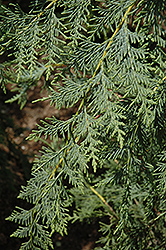It's all about ...
plants

Naylor's Blue Leyland Cypress
Cupressocyparis x leylandii 'Naylor's Blue'
Height: 70 feet
Spread: 20 feet
Sunlight:
![]()
![]()
Hardiness Zone: 6b
Other Names: x Cupressocyparis leylandii
Description:
Tall and fast growing, this narrowly pyramidal evergreen features attractive, dark blue-green foliage that matures to gray-green; excellent as a large articulation element in the landscape, but can be maintained as a screen or hedge
Ornamental Features
Naylor's Blue Leyland Cypress is primarily valued in the landscape for its distinctively pyramidal habit of growth. It has bluish-green evergreen foliage. The scale-like sprays of foliage remain bluish-green throughout the winter. The shaggy antique red bark adds an interesting dimension to the landscape.
Landscape Attributes
Naylor's Blue Leyland Cypress is an evergreen tree with a strong central leader and a distinctive and refined pyramidal form. Its relatively fine texture sets it apart from other landscape plants with less refined foliage.
This is a relatively low maintenance tree. When pruning is necessary, it is recommended to only trim back the new growth of the current season, other than to remove any dieback. It has no significant negative characteristics.
Naylor's Blue Leyland Cypress is recommended for the following landscape applications;
- Accent
- Vertical Accent
Planting & Growing
Naylor's Blue Leyland Cypress will grow to be about 70 feet tall at maturity, with a spread of 20 feet. It has a low canopy with a typical clearance of 3 feet from the ground, and should not be planted underneath power lines. It grows at a fast rate, and under ideal conditions can be expected to live for 70 years or more.
This tree does best in full sun to partial shade. It prefers to grow in average to moist conditions, and shouldn't be allowed to dry out. It is not particular as to soil type, but has a definite preference for acidic soils, and is able to handle environmental salt. It is somewhat tolerant of urban pollution. Consider applying a thick mulch around the root zone in winter to protect it in exposed locations or colder microclimates. This particular variety is an interspecific hybrid.
This plant is not reliably hardy in our region, and certain restrictions may apply; contact the store for more information.
